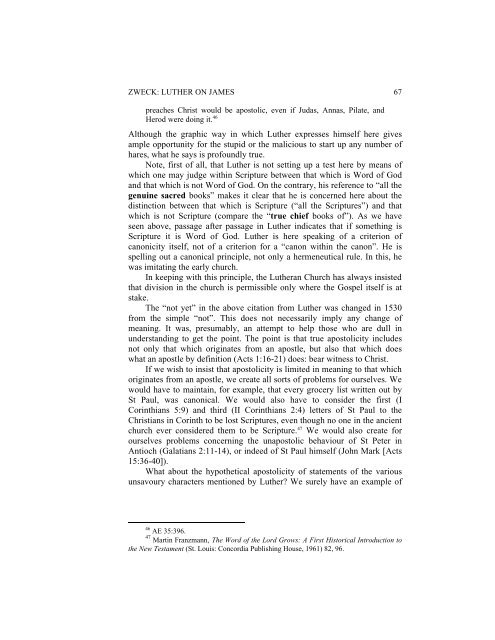LUTHERAN THEOLOGICAL REVIEW - Brock University
LUTHERAN THEOLOGICAL REVIEW - Brock University
LUTHERAN THEOLOGICAL REVIEW - Brock University
You also want an ePaper? Increase the reach of your titles
YUMPU automatically turns print PDFs into web optimized ePapers that Google loves.
ZWECK: LUTHER ON JAMES 67<br />
preaches Christ would be apostolic, even if Judas, Annas, Pilate, and<br />
Herod were doing it. 46<br />
Although the graphic way in which Luther expresses himself here gives<br />
ample opportunity for the stupid or the malicious to start up any number of<br />
hares, what he says is profoundly true.<br />
Note, first of all, that Luther is not setting up a test here by means of<br />
which one may judge within Scripture between that which is Word of God<br />
and that which is not Word of God. On the contrary, his reference to “all the<br />
genuine sacred books” makes it clear that he is concerned here about the<br />
distinction between that which is Scripture (“all the Scriptures”) and that<br />
which is not Scripture (compare the “true chief books of”). As we have<br />
seen above, passage after passage in Luther indicates that if something is<br />
Scripture it is Word of God. Luther is here speaking of a criterion of<br />
canonicity itself, not of a criterion for a “canon within the canon”. He is<br />
spelling out a canonical principle, not only a hermeneutical rule. In this, he<br />
was imitating the early church.<br />
In keeping with this principle, the Lutheran Church has always insisted<br />
that division in the church is permissible only where the Gospel itself is at<br />
stake.<br />
The “not yet” in the above citation from Luther was changed in 1530<br />
from the simple “not”. This does not necessarily imply any change of<br />
meaning. It was, presumably, an attempt to help those who are dull in<br />
understanding to get the point. The point is that true apostolicity includes<br />
not only that which originates from an apostle, but also that which does<br />
what an apostle by definition (Acts 1:16-21) does: bear witness to Christ.<br />
If we wish to insist that apostolicity is limited in meaning to that which<br />
originates from an apostle, we create all sorts of problems for ourselves. We<br />
would have to maintain, for example, that every grocery list written out by<br />
St Paul, was canonical. We would also have to consider the first (I<br />
Corinthians 5:9) and third (II Corinthians 2:4) letters of St Paul to the<br />
Christians in Corinth to be lost Scriptures, even though no one in the ancient<br />
church ever considered them to be Scripture. 47 We would also create for<br />
ourselves problems concerning the unapostolic behaviour of St Peter in<br />
Antioch (Galatians 2:11-14), or indeed of St Paul himself (John Mark [Acts<br />
15:36-40]).<br />
What about the hypothetical apostolicity of statements of the various<br />
unsavoury characters mentioned by Luther We surely have an example of<br />
46 AE 35:396.<br />
47 Martin Franzmann, The Word of the Lord Grows: A First Historical Introduction to<br />
the New Testament (St. Louis: Concordia Publishing House, 1961) 82, 96.













